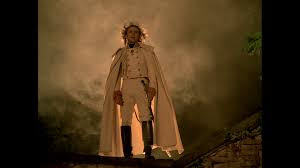 |
| Exquisite languor in The Marquise of O |
Jonas Akerlund's Polar is soul sucking dreck, redolent of urine and flop sweats.
After such a dispiriting cinematic experience, I relished the restraint, taste and moral probity that are the hallmarks of an Éric Rohmer film. The Marquise of O, from 1976, is a major work in his oeuvre. The first foreign language film and costume drama for the director, it is remarkably, almost overly, assured. Rohmer adapted a Kleist novella and would return to Kleist as a source for 1980's Catherine de Heilbronn, one of many Rohmer TV movies and documentaries I am eager to track down. The narrative, presented mostly in flashback, concerns an Italian woman who becomes mysteriously pregnant amidst the tumult of war with Russia in 1799. Edith Clever embodies the marquise and it is a great pity that she has so few film credits to her name. She provides a warm presence to a film without a dash of syrup.
Bruno Ganz portrays the Russian count who saves the marquise from being raped by marauding soldiers as her father's fort falls. He is the likely father of the Marquise's baby, but the marquise is not sure who the father is because she had been sedated with poppy tea. The shot of the Marquise passed out while lying on bright red sheets is among the most beautiful in cinematographer Nestor Almendros' storied career and an erotic invitation to rival those of Velazquez, Botticelli and Manet. How can we resist, Rohmer seems to suggest before fading, as usual, to black. The Count is first presented as an angel dressed in white saving the Marquise from above, as the Marquise herself later notes, but his rushed courtship after the rape presents a more tortured and ambivalent side to his character. Ganz became a frenzied Hitler meme in his dotage, but The Marquise of O shows his youthful range and subtlety. He personifies the Romanticism and neuroticism of the post Werther European hero.
Rohmer shifts the tenor of the film from melodrama to dry comedy to give the film tonal variety instead of monotony. The melodramatic nature of the film is heightened by the use of silent film techniques: titles, irises, fades to black. The marquise is truly an orphan of the storm by the time she is cast out of her father's house. When her father realizes the error of his ways and creeps back to beg his daughter's forgiveness, Rohmer opts for droll comedy. The father has become the child, made inarticulate by the certitude of his own guilt. Rohmer also uses the brief and absurd glimpses of combat for light comic effect.
There are also shifts between rigor, dissecting the nature of human relations, and languor, into which oozes life's sensual side. This tension is the crux of the late French master's work and makes The Marquise of O a dense text and a delight.
After such a dispiriting cinematic experience, I relished the restraint, taste and moral probity that are the hallmarks of an Éric Rohmer film. The Marquise of O, from 1976, is a major work in his oeuvre. The first foreign language film and costume drama for the director, it is remarkably, almost overly, assured. Rohmer adapted a Kleist novella and would return to Kleist as a source for 1980's Catherine de Heilbronn, one of many Rohmer TV movies and documentaries I am eager to track down. The narrative, presented mostly in flashback, concerns an Italian woman who becomes mysteriously pregnant amidst the tumult of war with Russia in 1799. Edith Clever embodies the marquise and it is a great pity that she has so few film credits to her name. She provides a warm presence to a film without a dash of syrup.
Bruno Ganz portrays the Russian count who saves the marquise from being raped by marauding soldiers as her father's fort falls. He is the likely father of the Marquise's baby, but the marquise is not sure who the father is because she had been sedated with poppy tea. The shot of the Marquise passed out while lying on bright red sheets is among the most beautiful in cinematographer Nestor Almendros' storied career and an erotic invitation to rival those of Velazquez, Botticelli and Manet. How can we resist, Rohmer seems to suggest before fading, as usual, to black. The Count is first presented as an angel dressed in white saving the Marquise from above, as the Marquise herself later notes, but his rushed courtship after the rape presents a more tortured and ambivalent side to his character. Ganz became a frenzied Hitler meme in his dotage, but The Marquise of O shows his youthful range and subtlety. He personifies the Romanticism and neuroticism of the post Werther European hero.
Rohmer shifts the tenor of the film from melodrama to dry comedy to give the film tonal variety instead of monotony. The melodramatic nature of the film is heightened by the use of silent film techniques: titles, irises, fades to black. The marquise is truly an orphan of the storm by the time she is cast out of her father's house. When her father realizes the error of his ways and creeps back to beg his daughter's forgiveness, Rohmer opts for droll comedy. The father has become the child, made inarticulate by the certitude of his own guilt. Rohmer also uses the brief and absurd glimpses of combat for light comic effect.
There are also shifts between rigor, dissecting the nature of human relations, and languor, into which oozes life's sensual side. This tension is the crux of the late French master's work and makes The Marquise of O a dense text and a delight.
 |
| An angel viewed from below |





No comments:
Post a Comment